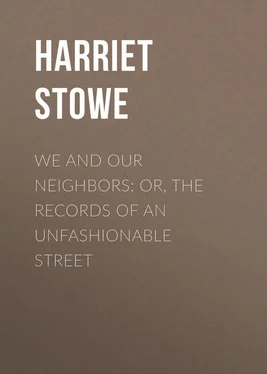Harriet Stowe - We and Our Neighbors - or, The Records of an Unfashionable Street
Здесь есть возможность читать онлайн «Harriet Stowe - We and Our Neighbors - or, The Records of an Unfashionable Street» — ознакомительный отрывок электронной книги совершенно бесплатно, а после прочтения отрывка купить полную версию. В некоторых случаях можно слушать аудио, скачать через торрент в формате fb2 и присутствует краткое содержание. ISBN: , Жанр: foreign_prose, на английском языке. Описание произведения, (предисловие) а так же отзывы посетителей доступны на портале библиотеки ЛибКат.
- Название:We and Our Neighbors: or, The Records of an Unfashionable Street
- Автор:
- Жанр:
- Год:неизвестен
- ISBN:http://www.gutenberg.org/ebooks/48603
- Рейтинг книги:4 / 5. Голосов: 1
-
Избранное:Добавить в избранное
- Отзывы:
-
Ваша оценка:
- 80
- 1
- 2
- 3
- 4
- 5
We and Our Neighbors: or, The Records of an Unfashionable Street: краткое содержание, описание и аннотация
Предлагаем к чтению аннотацию, описание, краткое содержание или предисловие (зависит от того, что написал сам автор книги «We and Our Neighbors: or, The Records of an Unfashionable Street»). Если вы не нашли необходимую информацию о книге — напишите в комментариях, мы постараемся отыскать её.
We and Our Neighbors: or, The Records of an Unfashionable Street — читать онлайн ознакомительный отрывок
Ниже представлен текст книги, разбитый по страницам. Система сохранения места последней прочитанной страницы, позволяет с удобством читать онлайн бесплатно книгу «We and Our Neighbors: or, The Records of an Unfashionable Street», без необходимости каждый раз заново искать на чём Вы остановились. Поставьте закладку, и сможете в любой момент перейти на страницу, на которой закончили чтение.
Интервал:
Закладка:
Well now, dear Mother, imagine a further complication. Harry is very anxious that we should have an evening once a week to receive our friends – an informal, quiet, sociable, talking evening, on a sort of ideal plan of his, in which everybody is to be made easy and at home, and to spend just such a quiet, social hour as at one's own chimney-corner. But fancy my cares, with all the menagerie of our very miscellaneous acquaintances! I should be like the man in the puzzle that had to get the fox and geese and corn over in one boat without their eating each other. Fancy Jim Fellows and Mr. St. John! Dr. Campbell, with his molecules and cerebration, talking to my little Quaker dove, with her white wings and simple faith, or Aunt Maria and mamma conversing with a Jewish Rabbi! I believe our family have a vague impression that Jews are disreputable, however gentlemanly and learned; and I don't know but Mr. St. John would feel shocked at him. Nevertheless, our Rabbi is a very excellent German gentleman, and one of the most interesting talkers I have heard. Oh! then there are our rococo antiquities across the street, Miss Dorcas Vanderheyden and her sister. What shall I do with them all? Harry has such boundless confidence in my powers of doing the agreeable that he seems to think I can, out of this material, make a most piquant and original combination. I have an awful respect for the art de tenir salon , and don't wonder that among our artistic French neighbors it got to be a perfect science. But am I the woman born to do it in New York?
Well, there's no way to get through the world but to keep doing, and to attack every emergency with courage. I shall do my possible, and let you know of my success.
Your daughter, Eva.CHAPTER V
A TEMPEST IN A TEAPOT
The housekeeping establishment of Eva Henderson, née Van Arsdel, was in its way a model of taste, order, and comfort. There was that bright, attractive, cosy air about it that spoke of refined tastes and hospitable feelings – it was such a creation as only the genius of a thorough home-artist could originate. There are artists who work in clay and marble, there are artists in water-colors, and artists in oils, whose works are on exhibition through galleries and museums: but there are also, in thousands of obscure homes, domestic artists, who contrive out of the humblest material to produce in daily life the sense of the beautiful; to cast a veil over its prosaic details and give it something of the charm of a poem.
Eva was one of these, and everybody that entered her house felt her power at once in the atmosphere of grace and enjoyment which seemed to pervade her rooms.
But there was underneath all this an unseen, humble operator, without whom one step in the direction of poetry would have been impossible; one whose sudden withdrawal would have been like the entrance of a black frost into a flower-garden, leaving desolation and unsightliness around: and this strong pivot on which the order and beauty of all the fairy contrivances of the little mistress turned was no other than the Irish Mary McArthur, cook, chambermaid, laundress, and general operator and adviser of the whole.
Mary was a specimen of the best class of those women whom the old country sends to our shores. She belonged to the family of a respectable Irish farmer, and had been carefully trained in all household economies and sanctities. A school kept on the estate of their landlord had been the means of instructing her in the elements of a plain English education. She wrote a good hand, was versed in accounts, and had been instructed in all branches of needle-work with a care and particularity from which our American schools for girls might take a lesson. A strong sense of character pervaded her family life – a sense of the decorous, the becoming, the true and honest, such as often gives dignity to the cottage of the laboring man of the old world. But the golden stories of wealth to be gotten in America had induced her parents to allow Mary with her elder brother to try their fortunes on these unknown shores. Mary had been fortunate in falling into the Van Arsdel family; for Mrs. Van Arsdel, though without the energy or the patience which would have been necessary to control or train an inexperienced and unsteady subject, was, on the whole, appreciative of the sterling good qualities of Mary, and liberal and generous in her dealings with her.
In fact, the Van Arsdels were in all things a free, careless, good natured, merry set, and Mary reciprocated their kindliness to her with all the warmth of her Irish heart. Eva had been her particular pet and darling. She was a pretty, engaging child at the time she first came into the family. Mary had mended her clothes, tidied her room, studied her fancies and tastes, and petted her generally with a whole-souled devotion. "When you get a husband, Miss Eva," she would say, "I will come and live with you ." But before that event had come to pass, Mary had given her whole heart to an idle, handsome, worthless fellow, whom she appeared to love in direct proportion to his good-for-nothingness. Two daughters were the offspring of this marriage, and then Mary became a widow, and had come with her youngest child under the shadow of "Miss Eva's" roof-tree.
Thus much to give back-ground to the scenery on which Aunt Maria entered, on the morning when she took the omnibus at Mrs. Van Arsdel's door.
Eva was gone out when the door-bell of the little house rang. Mary looking from the chamber window saw Mrs. Wouvermans standing at the door step. Now against this good lady Mary had always cherished a secret antagonism. Nothing so awakens the animosity of her class as the entrance of a third power into the family, between the regnant mistress and the servants; and Aunt Maria's intrusions and dictations had more than once been discussed in the full parliament of Mrs. Van Arsdel's servants. Consequently the arrival of a police officer armed with a search warrant could not have been more disagreeable or alarming. In an instant Mary's mental eye ran over all her own demesne and premises – for when one woman is both chambermaid, cook and laundress, it may well be that each part of these different departments cannot be at all times in a state of absolute perfection. There was a cellar table that she had been intending this very morning to revise; there were various short-comings in pantry and closet which she had intended to set in order.
But the course of Mrs. Wouvermans was straight and unflinching as justice. A brisk interrogation to the awe-struck little maiden who opened the door showed her that Eva was out, and the field was all before her. So she marched into the parlor, and, laying aside her things, proceeded to review the situation. From the parlor to the little dining-room was the work of a moment; thence to the china closet, where she opened cupboards and drawers and took note of their contents; thence to the kitchen and kitchen pantry, where she looked into the flour barrel, the sugar barrel, the safe, the cake box, and took notes.
When Mary had finished her chamber work and came down to the kitchen, she found her ancient adversary emerging from the cellar with several leaves of cabbage in her hands which she had gathered off from the offending table. In her haste to make a salad for a sudden access of company, the day before, Mary had left these witnesses, and she saw that her sin had found her out.
"Good morning, Mary," said Mrs. Wouvermans, in the curt, dry tone that she used in speaking to servants, "I brought up these cabbage leaves to show you. Nothing is more dangerous, Mary, than to leave any refuse vegetables in a cellar; if girls are careless about such matters they get thrown down on the floor and rot and send up a poisonous exhalation that breeds fevers. I have known whole families poisoned by the neglect of girls in these little matters."
Читать дальшеИнтервал:
Закладка:
Похожие книги на «We and Our Neighbors: or, The Records of an Unfashionable Street»
Представляем Вашему вниманию похожие книги на «We and Our Neighbors: or, The Records of an Unfashionable Street» списком для выбора. Мы отобрали схожую по названию и смыслу литературу в надежде предоставить читателям больше вариантов отыскать новые, интересные, ещё непрочитанные произведения.
Обсуждение, отзывы о книге «We and Our Neighbors: or, The Records of an Unfashionable Street» и просто собственные мнения читателей. Оставьте ваши комментарии, напишите, что Вы думаете о произведении, его смысле или главных героях. Укажите что конкретно понравилось, а что нет, и почему Вы так считаете.












